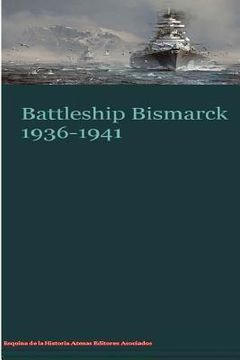Reseña del libro "Battleship Bismarck 1936-1941 (en Inglés)"
Speech by Herr Hitler at Wilhelmshaven on April 1, 1939 GERMANS! Volksgenossen und Volksgenossinnen! Whoever wishes to estimate the decline and regeneration of Germany must look at the development of a city like Wilhelmshaven. A short time ago it was a dead spot almost without any title to existence, without any prospect of a future; to-day it is filled again with the hum of work and production. It is good if one recalls again to memory this past. When the city experienced its first rise to prosperity, this coincided with the regeneration of the German Reich after its battle for unification. This Germany was a Germany of peace. At the same time as the so-called peace-loving virtuous nations were carrying on quite a number of wars, the Germany of that time had only one aim, namely, to preserve peace, to work in peace, to increase the prosperity of her inhabitants and thereby to contribute to human culture and civilisation. This peace-time Germany tried with unceasing industry, with genius and with perseverance to set up its inner life and to assure for itself a proper place in the sun through participation in peaceful rivalry with other nations. In spite of the fact that this Germany was for decades the surest guarantor of peace and devoted herself only to her own peaceful business, other nations, and particularly their statesmen, could not refrain from persecuting this regeneration with envy and hate and finally answering it with a war. We know to-day from historical records how the encirclement policy of that time had been systematically pursued by England. We know from numerous established facts and publications that in that land one was imbued with the conception that it was necessary to crush Germany militarily because its annihilation would assure to every British citizen a larger measure of this world's goods. Certainly Germany at that time committed errors. Its worst error was to see this encirclement and to take no steps in time to avoid it. The only reproach which we can level at the regime of that day is the fact that it had full knowledge of the devilish plan for a surprise attack on the Reich, and even so was unable to make up its mind to avoid in time such an attack, but allowed this encirclement to mature right up to the outbreak of the catastrophe. The result was the World War. In this war the German people, although they were in no way armed the best, fought heroically. No nation can claim for itself the glory of having beaten us to our knees, least of all those whose statesmen to-day are boasting. Germany at that time remained unbeaten and unvanquished on land, sea and in the air. And yet we lost the war. We know the power which at that time vanquished Germany. It was the power of falsehood, the poison of a propaganda which did not shrink from distortion and untruthfulness and which caught the German Reich because it was unprepared and defenceless. When the Fourteen Points of President Wilson were announced, many German "Volksgenossen," particularly the leading men of the time, saw in those Fourteen Points not only the possibility for ending the World War but for a final pacification of all nations of this world. There would come a peace of reconciliation and understanding, a peace which would recognise neither victors nor vanquished, a peace without war indemnities, a peace of equal rights for all, a peace of equal distribution of colonial territory and of equal consideration for colonial desiderata. A peace which would finally be crowned with a league of free nations. A peace which, by guaranteeing equal rights would make it appear superfluous for nations in future still to endure the burden of armament which, as is known, previously weighed down so heavily on them. Disarmament, therefore, and in fact disarmament of all nations.

